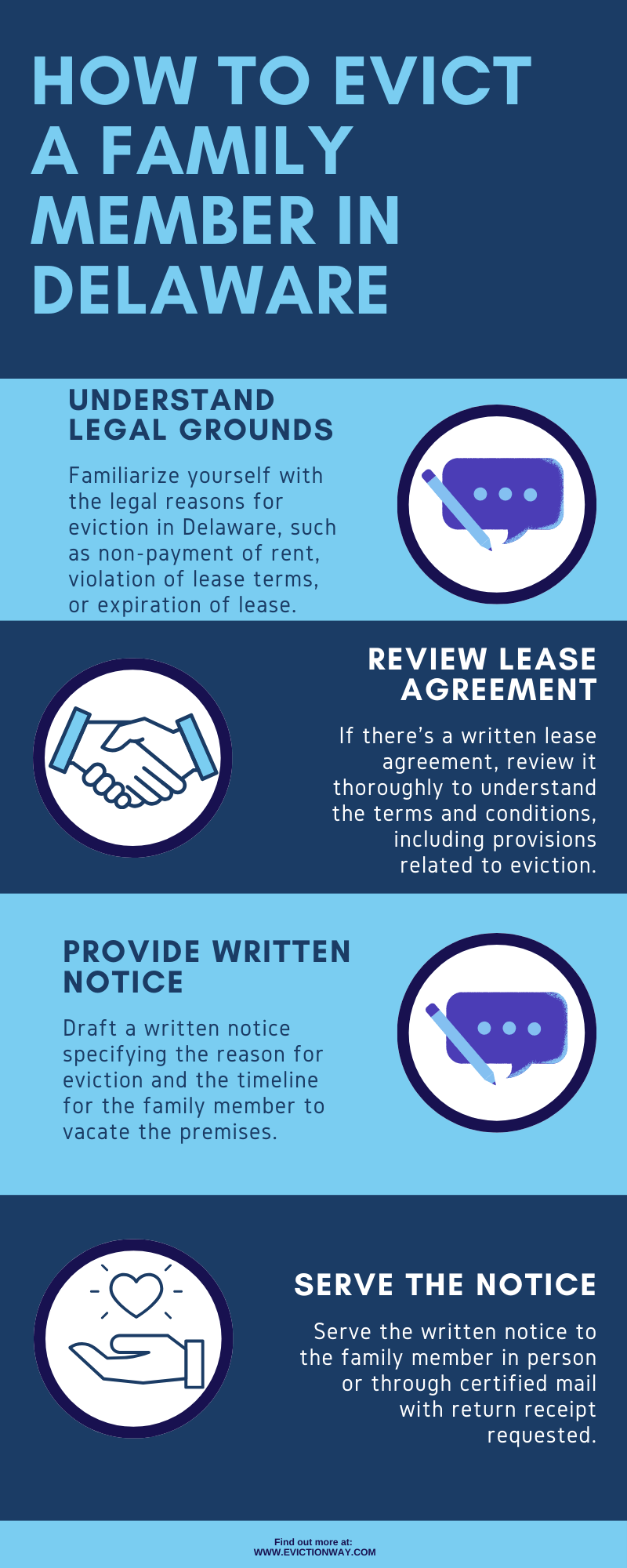Evicting a family member can be a difficult and emotional process, especially in Delaware. The laws governing evictions can be complex and vary from state to state. In this blog article, we will discuss the best way to evict a family member in Delaware, including the legal process and tips on how to do it politely.
We will also provide information on the laws involved in evicting a family member in Delaware, including the notice requirements and the grounds for eviction.
Whether you are a landlord or a tenant, it is important to be aware of the laws governing evictions in Delaware. By following the steps outlined in this blog article, you can help to ensure that the eviction process is carried out fairly and legally.

How To Evict a Family Member In Delaware
Evicting a family member from your home can be a difficult and emotional process. However, it is important to remember that you have the right to protect your property and your well-being. If you are considering evicting a family member, it is important to follow the proper legal procedures.
1. Give Notice
The first step in evicting a family member is to give them written notice. The notice should state the reason for the eviction and the date by which they must vacate the property. The notice must be served in person or by certified mail.
2. File a Complaint
If the family member does not vacate the property by the date specified in the notice, you will need to file a complaint with the court. The complaint should state the facts of the case and the relief you are seeking.
3. Attend a Hearing
Once you have filed a complaint, the court will schedule a hearing. At the hearing, you will have the opportunity to present your case and the family member will have the opportunity to present their defense.
4. Obtain a Judgment
If the court finds in your favor, it will issue a judgment of possession. The judgment will order the family member to vacate the property.
5. Enforce the Judgment
If the family member does not vacate the property by the date specified in the judgment, you can have the judgment enforced by the sheriff. The sheriff will remove the family member from the property and return it to you.
6. Seek Legal Help
Evicting a family member can be a complex and challenging process. It is important to seek legal help if you are considering evicting a family member. An attorney can help you understand your rights and protect your interests.

How Much Does it Cost to Evict a Family Member in Delaware?
Evicting a family member can be a difficult and expensive process. The cost of eviction will vary depending on the specific circumstances of the case, but there are some general costs that you can expect to incur.
| Expense | Estimated Cost | Notes |
|---|---|---|
| Court Filing Fees | $45 – $55 | The cost depends on the county and the court. |
| Process Service Fees | $40 – $150 | For the official delivery of the eviction notice. |
| Attorney Fees | $500 – $5,000+ | Highly variable, based on case complexity. |
| Changes to Locks/Security | $50 – $200 | To re-secure the property post-eviction. |
| Storage Costs for Tenant’s Belongings | Varies | If necessary to store the tenant’s possessions. |
| Lost Rent | Varies | Based on how long the property is unoccupied. |
| Miscellaneous Costs (e.g., copying) | Varies | Additional out-of-pocket costs might be incurred. |
- Filing fees: The first step in the eviction process is to file a complaint with the court. The filing fee for an eviction complaint in Delaware is $45.
- Service of process: Once the complaint has been filed, it must be served on the tenant. The cost of service of process will vary depending on the method of service.
- Attorney fees: If you hire an attorney to represent you in the eviction process, you will be responsible for their fees. Attorney fees can vary widely, so it is important to get a quote from an attorney before hiring them.
- Court costs: If the case goes to trial, you will be responsible for court costs. Court costs can include the cost of the jury, the bailiff, and the court reporter.
- Total cost: The total cost of evicting a family member in Delaware can range from a few hundred dollars to several thousand dollars. It is important to factor in all of the potential costs before you begin the eviction process.
FAQs: Evicting a Family Member in Delaware
Here are some of the most asked questions.

What are the grounds for evicting a family member in Delaware?
In Delaware, you can evict a family member if they have violated the terms of their tenancy, such as failing to pay rent or breaking the lease agreement. You can also evict a family member if they have engaged in criminal activity or if they are a danger to you or other tenants.
How do I start the eviction process in Delaware?
To start the eviction process in Delaware, you must first give your family member a written notice to vacate. The notice must state the reason for the eviction and the date by which your family member must leave. If your family member does not vacate by the deadline, you can file a complaint with the Justice of the Peace Court.
What steps should I follow to legally evict a family member who doesn’t have a lease agreement?
- Understand Your Rights
- Consider Alternatives to Eviction
- Provide Written Notice
- Follow Local Notice Periods
- File for Eviction (if Necessary)
What happens if my family member refuses to leave?
If your family member refuses to leave after you have filed a complaint with the Justice of the Peace Court, the court will issue a summons. The summons will order your family member to appear in court and explain why they should not be evicted. If your family member does not appear in court, the court may issue a default judgment and order your family member to be evicted.

Can I evict a family member who is a minor?
Yes, you can evict a family member who is a minor. However, the process is more complicated than evicting an adult. You must first file a petition with the Family Court. The court will then hold a hearing to determine whether or not the eviction is in the best interests of the child.
What are some tips for evicting a family member in Delaware?
Here are some tips for evicting a family member in Delaware:
- Document everything: Keep a record of all communications with your family member, including any notices to vacate and court filings.
- Be prepared to go to court: If your family member does not vacate by the deadline, you will need to file a complaint with the Justice of the Peace Court.
- Seek legal help: If you are having difficulty evicting your family member, you should seek legal help from an attorney.
Related:
